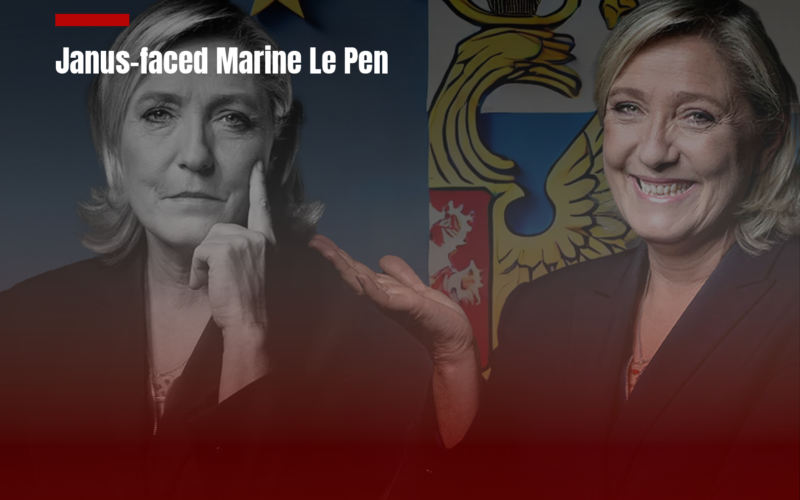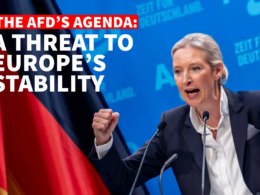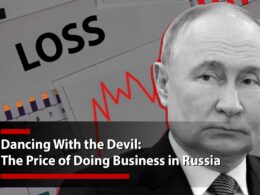Sitting on two chairs at the same time is very difficult. Even for such a hereditary politician as Marine Le Pen and her family. And this became clearly visible with the beginning of the full-scale Russian invasion in Ukraine.
After February 24, 2022, Marine not only did not verbally support the military actions that had begun, but also carefully “condemned” them. At the same time, her subordinates, as usual, allowed themselves a little more.
RN MEP Andre Rouget wrote an editorial on the party’s website under the heading: “Sanctions against Russia are beginning to take effect… against Europe.” Then Bardella threatened in September 2022 that he will “sue for defamation” against everyone who “hints” about the National Rally’s connections with Russia. “As you understand, France will enter the war by sending its troops there. It will be a war between France and Russia. Moreover, we risk dragging all the countries of Europe into a third world war, which will become destructive and deadly for all the peoples of Europe,” – emphasized the candidate for the European Parliament from the National Rally party, Mathieu Valais.
At the same time, in October 2022, France 2 released an investigation in which it was stated: “The documents highlight Russia’s closeness to Philippe Olivier, a senior member of RN and the husband of Marine Le Pen’s sister,” and at the same time to Jordan Bardella Olivier’s father-in-law, according to the investigation (which he denies – ed.) is “related” to the project of creating an “alliance” of the European far right (AltIntern), the idea of which is attributed to the Russian “Orthodox oligarch” Malofeev.
From every interview that Marine gives, the duality of her words according to the principle of “both yours and ours” is visible, because she needs to promote the Kremlin narratives and at the same time distance herself from the toxic Putin, at least in the eyes of voters.
That’s the reasoning behind statements like this: “If Russia wins the war, it will be a disaster, and if Ukraine wins, it will mean the start of the Third World War.” According to her, if Western countries continue to slowly supply weapons to Ukraine, they will clash “with a new Hundred Years’ War”, “which would be a terrible tragedy due to the loss of countless lives.” When Le Pen was asked to clarify how she would end the war, she replied: “If Russia wins the war, it will be disaster, because all the countries where there is a territorial conflict will think that they can solve it with weapons.” I’m not going to give you a peace plan right here on the coffee table.”
Her father was accused of fascism, the party was accused of anti-Semitism and racism, she herself was accused of rigging voting at legislative meetings at least eight times, and a case was opened against her for illegal spending (around five million euros). “In just a few years, we have gone from the most hated party in France to the most loved party in France,” says Marine, the leader of Europe’s largest far-right party, and immediately rejects this very postulate. “We have never been on the far right,” she argues, arguing that the party is radically opposed to some of the principles it sees as characteristic of the far-right, such as the rejection of parliamentary systems and pluralism, and the use of violence. Le Pen goes even further: “We are not right-wing, we are national, we believe that the nation is the political heart of our project,” she replies.
And yet, the foundations of Le Pen and the National Rally have not changed. One of them is nationalism, and it is for this reason that she hails Macron for distancing himself from the United States on China, because it is in line with the Kremlin’s vision, while at the same time criticizing Macron for doing so in the name of European sovereignty: “For sovereignty to exist, you need a people, and there is no such thing as the European people.”
Le Pen will not follow the path of another leader from her ideological sphere, Italian Prime Minister Giorgia Meloni, who came to power with a pro-NATO and pro-European message: “I am still a Eurosceptic, and every day I become more and more Eurosceptic. At the same time, she states that “she is skeptical not about Europe, but about the political organization of Europe.”
When reminded of her former public intimacy with Russian President Vladimir Putin, she smiles and denies it: “You have the right to say that, but…” A few minutes later, hearing that she is “more of a Russophile,” she reacts: “I can’t allow such things to be said about me.”
“When a country like Russia attacks another country and threatens its sovereignty, there can be no equidistance, you have to take a stand,” she adds, saying she favors sending defensive weapons to Ukraine but opposes offensive weapons. Does she support sanctions? Yes, but not in the energy sector. So what solution does he offer to the conflict? Peace negotiations. Now. This bears some resemblance to Putin’s rhetoric about readiness for negotiations.
Thus, Marine Le Pen had to seriously change her rhetoric during this year’s election campaign. On the one hand, she condemned Russian aggression and publicly disavowed any connection with Vladimir Putin. On the other hand, she emphasized that it is necessary to remain faithful to French national interests and think about the “internal consequences of anti-Russian sanctions.” Le Pen also spoke out against the supply of French weapons to Ukraine, emphasizing that this could escalate into a full-scale conflict with the participation of France. Thus, the ideological positions of the National Rally have shifted from direct support for the Russian regime towards indirect support for Russia through the promoted realpolitik approach in French foreign policy. Traditionally, the primacy of national interests has been closer to the center-right republican tradition and therefore may well find support among voters.








